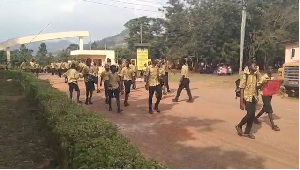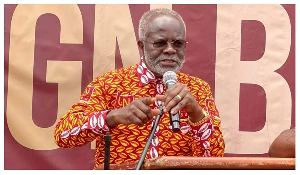Prof Blessings
For nine hundred million dollars ($900,000,000), minus a few hundred million dollars that the Ghanaian taxpayer has to pay off, for the existing debts of Ghana Telecom, our previous government unlawfully sold the birthright of every Ghanaian, for the unfettered ownership of Land, to a foreign entity. Vodafone not only unlawfully owns substantial real estate in Ghana now, like transmission facilities and offices, but it can potentially take any lands it wants. The most frightful specter is having a foreign entity wielding enormous power and control over all lands in Ghana. They will exert that influence in two ways:
Vodafone may utilize the government power of Eminent Domain to gain access to any lands it wants to lay down phone lines. It already has considerable rights through the deeds it has obtained from the Ghana Telecom to give it perpetual utility easements; over any land in Ghana. This control over lands in Ghana is for much longer than the nine hundred and ninety-nine years it initially sought, but was denied by the rubberstamp NPP majority parliament. The outright illegal transfer and assignment of deeds inflicts the second harm, which has already been effected by the ratification of the Vodafone Sales agreement. This is by virtue of the provisions, in schedule 16 to the Agreement that the government jammed through the acquiescent parliament. In a flagrant contravention of the constitution, the parliamentarians and their cronies in the Executive transferred real property to a foreign ownership, beyond what the statutory edicts of the Law allows:
According to CONCERNED GHANAIAN CITIZENS, these are the assets transferred, sold, and assigned, per the stipulations of the contract ratified by the NPP:
b. VRA Fibre Network: the optical fibre network installed by VRA with public funds which is incorporated within the VRA Electrical Transmission Network and used for more efficient distribution of electrical power to end users. [These assets have been installed on lands acquired from Ghanaian citizens, who had no choice but to surrender their interest in their lands to the VRA, sometimes without compensation]
c. VRA Fibre Assets: which comprises all property equipment and assets relating to the VRA Fibre Network including the VRA Fibre Units and all other assets and equipment that are set out in the Assets Register of the VRA. The VRA Fibre units are the systems that contain the Optical wires which are housed within the Optical Ground Wires - composite cable constructions that run along the VRA Electrical Transmission Network.
d. Access to the VRA Electrical Transmission Network: this means the electrical transmission network owned by VRA and operated by VRA, including all lands, buildings, towers, cables , equipment and other assets used by VRA in the generation and supply of electricity and related services.
e. FibreCo: a company established by the National Communications Authority (NCA) as a communications backbone for the country..
f. Towers and Radio buildings in Takoradi - VRA and the Ministry of Finance are required to ensure that the towers and radio buildings in Takoradi procured with public funds, are assigned, not sold to Vodafone.
The provisions of law that prohibit all of those transfers land transfers, for the duration sought by and granted to Vodaphone, is outlined below:
The constitution of Ghana vests in the President, title to all public lands within it and the government has the additional power of eminent domain to take any real property, for the public good. The right to the sale, or granting of possession of land in Ghana, is constitutionally curtailed, even to a person of Ghanaian nationality, and even more rigorously against foreign ownership. The relevant clauses in the constitution are as follows:
CHAPTER TWENTY-ONE -LANDS AND NATURAL RESOURCES
Public Lands 257.
(1) All public lands in Ghana shall be vested in the President on behalf of, and in trust for, the people of Ghana.
(2) For the purposes of this article, and subject to clause (3) of this article, "public lands" includes any land which, immediately before the coming into force of this Constitution, was vested in the Government of Ghana on behalf of, and in trust for, the people of Ghana for the public service of Ghana, and any other land acquired in the public interest, for the purposes of the Government of Ghana before, on or after that date.
Ownership of land by Non-Citizens - 266.
(1) No interest in, or right over, any land in Ghana shall be created which vests in a person who is not a citizen of Ghana a freehold interest in any land in Ghana.
(2) An agreement, deed or conveyance of whatever nature, which seeks, contrary to clause (1) of this article, to confer on a person who is not a citizen of Ghana any freehold interest in, or rights over, any land is void.
(4) No interest in, or right over, any land in Ghana shall be created which vests in a person who is not a citizen of Ghana a leasehold for a term of more than fifty years at any one time.
The most obvious evidence for making the case that the Vodaphone sale is unconstitutional can best be demonstrated in the sample perpetual utility deed below, which is as close as you can get to a legal document. Actual easements have even more powers; like the right to the airspace above a real property, (this is for power lines and telephone wires). You will see the exact power and control that Vodaphone now has over every property in Ghana. This power can only be acquired by deeded restrictions and covenants, which is constrained by the constitution from been assigned and transferred to a foreign entity, for more than fifty years. Vodaphone had the rights transferred to itself from the VRA. The easements were already deeded into perpetuity to the VRA, so it could install power lines to every property in Ghana, as well as the telephone company bought by Vodaphone. These easements attach to every Real property in Ghana, for longer than 999 years.
All of the rights and covenants that were previously deeded to the VRA (Volta River Authority), as the monopoly on electric power provision, as well as the backbone of the fibre optic network, has now been transferred and assigned, solely, to Vodaphone. This is because the fibre optic cables run together with the power lines, but in addition, all telephone lines and poles now belong to Vodaphone. Below, is the typical wording for a perpetual easement.
I previously wrote up and secured a deed for a perpetual easement for ingress, over an adjoining property, to the landlocked one I had purchased from one owner of both properties. My deed made the adjoining lot useless for a building, until I put in an alternate access road and relinquished the easement. That is an example of the restrictive nature of easements.
SAMPLE DEED OF PERPETUAL EASEMENT (Public Utility Service)
THIS DEED, made this _____ day of _____, 200_, between, the _______ ("Owner"), whose address is ________ and Vodaphone ("Utility"), a Statutory Public Service Provider, whose address is Accra, Ghana.
WITNESSETH:
1. That for and in consideration of the covenants and agreements herein set forth, the sum of 0 GHcedis (New Ghana Cedis) and other good and valuable consideration proffered by the Utility to the Owner, the receipt and adequacy of which is hereby acknowledged, the Owner, who is the recorded owner of that certain parcel of real property described in Exhibit "A" attached hereto and incorporated herein by this reference, hereby grants, sells and conveys to the Utility, its successors and assigns, a perpetual non-exclusive easement to install, construct, operate, maintain, repair, reconstruct, replace, inspect, survey, and remove, at any time and from time to time, underground and above-ground utilities and pipelines, including all underground and above-ground improvements and appurtenances thereto, together with an easement for access for construction, maintenance and repair on, along, and in all of the hereinafter described more fully on Exhibit "B", attached hereto and incorporated herein by this reference.
2. The Owner further grants to the Utility:
(a) the right from time to time to change the grade of the easement, enlarge, improve, reconstruct, relocate and replace any above-ground and underground utility lines, improvements or other appurtenances constructed hereunder with any other number or type of above-ground and underground utilities and pipelines, or other structures either in the original location or at any alternate location or locations within said perpetual easement. Upon completion of the repairs and/or maintenance, the Utility will return the grade to as near the original as possible; and
(b) the right to mark the location of said easement by suitable markers set in or on the ground; provided that permanent markers shall be placed in locations which will not interfere with any reasonable use Owner shall make of said perpetual easement.
3. Owner reserves the right to use said easement for purposes which will not interfere with Utility's full enjoyment of the right hereby granted; and the parties further agree that the uses of said easement by Owner and the agreements concerning those uses shall be as follows:
(a) Owner shall not erect or construct any building or other structure, or drill or operate any well, or construct any permanent obstruction, or decrease or substantially increase ground level, which will interfere with Utility's aboveground and underground use. In addition, the Owner shall not allow the installation of other utilities, in said easement without obtaining the written permission of the Utility;
(b) Owner shall take no action which would impair or in any way decrease or substantially increase the ground level, or the lateral, or subjacent support for, or which would interfere with the use of the aforementioned above-ground and underground utility lines, improvements and appurtenances within the easement without obtaining the specific written permission of the Utility.
(c) The Owner may use the easement for any and all lawful purposes not inconsistent with the purposes set forth in this easement, including but not limited to setbacks, density, open space, landscaping, roadways, and parking, so long as such uses do not interfere with the continued use, maintenance and repair of, or cause damage to the facilities constructed within the easement.
(d) In the event any of the terms of this Paragraph 3 are violated by the Owner or by any person in privity with the Owner, such violation shall be immediately corrected and eliminated upon receipt of notice from the Utility, and if not corrected, the Utility shall have the right to correct and eliminate such violation, and the Owner, its heirs, administrators, successors and assigns, shall promptly pay the costs to correct said violation including, but not limited to, Utility's reasonable attorney costs. If such violation is not corrected, the Utility shall also have the right to file appropriate proceedings to enjoin any violation and request specific performance of the conditions described herein. This provision shall not preclude the Utility from recovery of damages to the improvements caused by Owner's acts or omissions. The Utility reserves the right to do all acts necessary to immediately remedy any emergency or situation that may arise that disrupts or affects the utility.
4. Utility shall restore to its original condition, or as close thereto as possible, except as necessarily modified to accommodate the facilities and appurtenances installed by the Utility, or repair any damages caused on said easement, or improvements permitted by this easement, arising out of the construction or reconstruction, maintenance and repair of said above-ground and underground utilities, pipelines, and appurtenances.
5. In case the Utility shall permanently abandon the easement herein granted, and cease to use the same, all right title and interest hereunder of Utility shall revert to the then owner of the property.
6. The parties hereto agree that neither has made or authorized any agreement with respect to the subject matter of this instrument other than expressly set forth herein, and no oral representation, promise, or consideration different from the terms herein contained shall be binding on either party, or its agents or employees, hereto.
7. Owner warrants that it has full and lawful authority to make the grant hereinabove contained, and promise and agrees to defend Utility in the exercise of its right hereunder against any defect in Owner's title to the land involved or Owner's rights to make the grant hereinabove contained.
8. All of the covenants herein contained shall be binding upon and inure to the benefit of the parties hereto, their respective heirs, personal representatives, successors and assigns, into perpetuity.
The deed above presents a very cogent point on the control that Vodaphone now wields over every landed property in Ghana and it highlights how Vodaphone could run roughshod over the right of every Ghanaian to the peaceful and undisrupted (quiet) enjoyment of their property. That harm may be mitigated with a judicial review, or tort action for remedy, with the argument that it is not in the greater public interest to cause a dislocation to a significant segment of the population, just for the benefit of a few. Vodaphone's attempt to use the power of Eminent domain could trigger a case like that.
I am restricting my contention to strictly the fact that the constitution of Ghana bars Vodaphone from having any "INTEREST" in Real Property, for a duration that is longer than 50 years. Utility easements are into perpetuity, so the statutory restrictions on such an assignment and transfer is valid and enforceable. The transfer of buildings and other assets, like transmission facilities on Lands is also curtailed by law.
One element that I did not include in the wording for the sample deed is the right to assign title. That is, conceivably, what is included in all the existent deeds that the VRA was in possession of and which they were mandated, under the Vodaphone sales agreement, to transfer and assign to Vodaphone, a foreign entity. They may lawfully do so, but only to transfer, or assign leasehold interest for a term not in excess of fifty years.
Most Ghanaians do not even have freehold interest on their lands, but rather ninety-nine year old leasehold tenancy. How does a foreign entity gain more than my birthright for a sum of money?
Profess Blessings
Opinions of Saturday, 24 January 2009
Columnist: Prof Blessings














